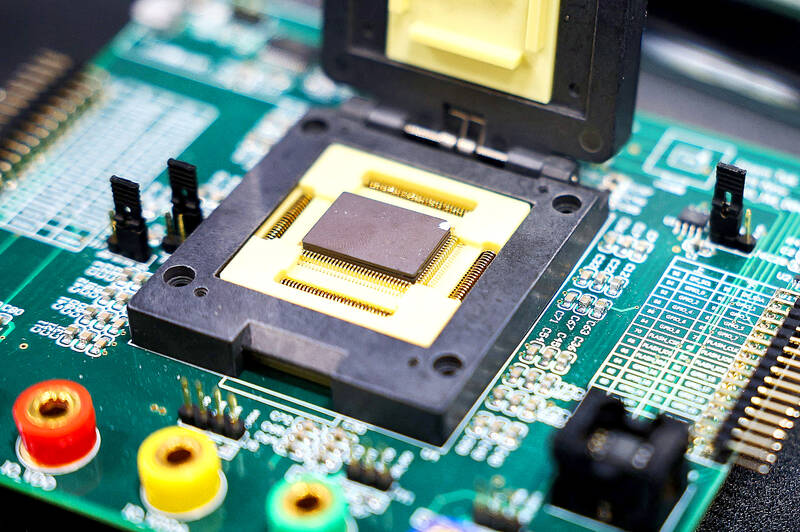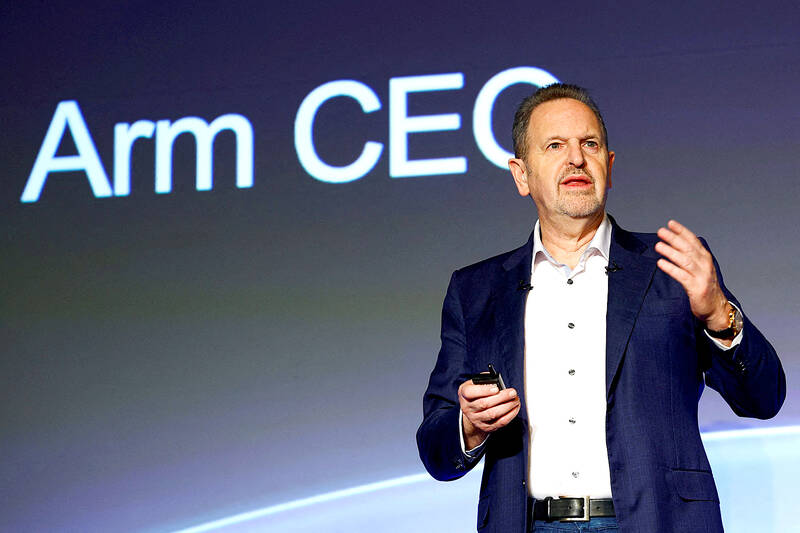US President Donald Trump’s administration plans to rescind the previous administration’s artificial intelligence (AI) chip curbs as part of a broader effort to revise semiconductor trade restrictions that have drawn strong opposition from major tech companies and foreign governments, people familiar with the matter said.
The repeal, which is not yet final, seeks to refashion a policy launched under former US president Joe Biden that created three broad tiers of countries for regulating the export of chips from Nvidia Corp and others.
The Trump administration would not enforce the AI diffusion rule when it takes effect on Thursday next week, the people said.

Photo: AFP
The changes are taking shape as Trump prepares for a trip to the Middle East, where a number of countries, including Saudi Arabia and the United Arab Emirates, have bristled at restrictions on their ability to acquire AI chips.
Trump officials are actively working toward a new rule that would strengthen the control of chips abroad, the people said.
Shares of chipmakers rose on Wednesday after Bloomberg News reported on the move. Nvidia climbed 3.1 percent, and the Philadelphia Stock Exchange Semiconductor Index — a closely watched benchmark — gained 1.7 percent.

Photo: Reuters
“The Biden AI rule is overly complex, overly bureaucratic and would stymie American innovation,” the US Department of Commerce’s Bureau of Industry and Security said in a statement. “We will be replacing it with a much simpler rule that unleashes American innovation and ensures American AI dominance.”
The commerce department would continue to strictly enforce chip export curbs while it develops a new rule, the people said.
One element would be to impose chip controls on countries that have diverted chips to China, including Malaysia and Thailand, one of the people said.
Meanwhile, Arm Holdings PLC shares fell more than 10 percent in late trading after giving a disappointing sales forecast for the current quarter, stoking concerns about a tariff-fueled slowdown for the chip industry.
Revenue would be US$1 billion to US$1.1 billion in the fiscal first quarter, Arm said in a statement on Wednesday. Wall Street had estimated a number at the highest end of that range. Profit would be US$0.30 to US$0.38 a share, minus certain items, also lower than analysts’ projections.
“We’ve been conservative to make sure we don’t overreach,” Arm CEO Rene Haas said in an interview. “The health of the business is unbelievably strong. We’re seeing huge momentum in our data center business.”
Customers continue to push ahead with investment in chips, particularly for AI computing, and that is benefiting Arm, he said.
Arm decided not to provide investors with an annual target, because of economic uncertainty, executives told analysts on a call.
A dearth of forecasts from customers for this year means that Arm has less data on which to make its own projections, Arm chief financial officer Jason Child said.
Arm’s products — classified as services — are not directly affected by tariffs, Child said, adding that any hit, which has not been felt so far, would come in the form of suppressing demand for devices such as smartphones.

In Italy’s storied gold-making hubs, jewelers are reworking their designs to trim gold content as they race to blunt the effect of record prices and appeal to shoppers watching their budgets. Gold prices hit a record high on Thursday, surging near US$5,600 an ounce, more than double a year ago as geopolitical concerns and jitters over trade pushed investors toward the safe-haven asset. The rally is putting undue pressure on small artisans as they face mounting demands from customers, including international brands, to produce cheaper items, from signature pieces to wedding rings, according to interviews with four independent jewelers in Italy’s main

Japanese Prime Minister Sanae Takaichi has talked up the benefits of a weaker yen in a campaign speech, adopting a tone at odds with her finance ministry, which has refused to rule out any options to counter excessive foreign exchange volatility. Takaichi later softened her stance, saying she did not have a preference for the yen’s direction. “People say the weak yen is bad right now, but for export industries, it’s a major opportunity,” Takaichi said on Saturday at a rally for Liberal Democratic Party candidate Daishiro Yamagiwa in Kanagawa Prefecture ahead of a snap election on Sunday. “Whether it’s selling food or

CONCERNS: Tech companies investing in AI businesses that purchase their products have raised questions among investors that they are artificially propping up demand Nvidia Corp chief executive officer Jensen Huang (黃仁勳) on Saturday said that the company would be participating in OpenAI’s latest funding round, describing it as potentially “the largest investment we’ve ever made.” “We will invest a great deal of money,” Huang told reporters while visiting Taipei. “I believe in OpenAI. The work that they do is incredible. They’re one of the most consequential companies of our time.” Huang did not say exactly how much Nvidia might contribute, but described the investment as “huge.” “Let Sam announce how much he’s going to raise — it’s for him to decide,” Huang said, referring to OpenAI

The global server market is expected to grow 12.8 percent annually this year, with artificial intelligence (AI) servers projected to account for 16.5 percent, driven by continued investment in AI infrastructure by major cloud service providers (CSPs), market researcher TrendForce Corp (集邦科技) said yesterday. Global AI server shipments this year are expected to increase 28 percent year-on-year to more than 2.7 million units, driven by sustained demand from CSPs and government sovereign cloud projects, TrendForce analyst Frank Kung (龔明德) told the Taipei Times. Demand for GPU-based AI servers, including Nvidia Corp’s GB and Vera Rubin rack systems, is expected to remain high,